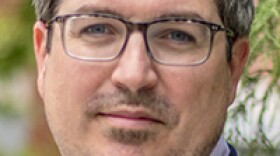The dirge of propaganda, half-truths, and lies seems to be normalized, from the White House podium to your online chat page. But there are ways to counter this problem.
Damian Radcliffe of the University of Oregon said this past election cycle saw lots of questionable claims and rumors, ranging from Hunter Biden’s laptop to purported emailed threats from the Proud Boys.
“From my perspective that’s why media literacy skills, pushing back on conspiracy theories, and continuing to shine a light on the importance of tech platforms and the work that they’re doing…those are all really vital things that we need to be doing moving forward,” said Radcliffe.
Besides individuals developing a healthy skepticism, media has also gotten its stride in handling misinformation. This includes President Trump’s remarks on COVID-19 and mail-in ballots.

“So we’ve seen major networks being more willing to cut away from the president speaking, and also to be more forthright in the corrections that they’ve offered," continued Radcliffe.
"Four to five years down the line, it’s as if they’re finally starting to get a handle on how push back against misleading information.”
Worldwide, fact-checking organizations have also increased, by 200 percent in the last four years.
Copyright 2020, KLCC.







